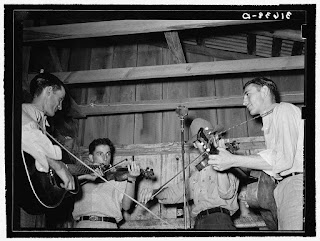La plus vielle de la bande, mais, c'est la plus vaillant,
C'est la plus contente, elle a les yeux canailles,
Mais, dis pas à ta mom, mais, j'ai goutté ton bec,
Mais, dis pas à ton pop, mais, si j'ai pas la bonne tête,
C'est la mienne, mais, au péril de la vie,
Chère cousinne, mais, donne-moi, donc, celle-làMais, si c'est pas celle-là moi, j'en veux pas du tout,Petit galop, mais, pour la Pointe au Pin.
 |
| John Bertrand |
Bertrand was a blacksmith from the area around Opelousas known as Prairie Ronde. Together with Milton Pitre, they traveled to Chicago, IL and recorded "Cousinne Lilly" (#12725). It's most likely that John was singing about the courtship, and eventual marriage, of his brother Eddie to their second cousin, Lillian Joubert. In the song, he repeats the same verse, changing the placement of the line "petite galop" from the end to the middle. A "petite galop", or "small gallop", refers to the typical three-beat gait of a horse; also known as a canter.
The oldest of the group, well, is the most sociable,
She's very calm, she has mischievous eyes,
Well, don't tell your mom, well, I kissed your lips,
Well, don't tell your dad, well, unless you don't have a good mind,
She's mine, well, bet your life,
Dear cousin, well, give her to me, that one,However, if that one's not mine, I don't want anything,Let's canter, well, to Pine Point.
Given the lack of Paramount's Cajun releases found in Louisiana, it seems the company missed out on an opportunity. It's quite possible that Paramount failed to adequately distribute the bulk of this music in the south and struggled to improve sales. Nevertheless, "Cousinne Lilly" remained a popular tune throughout the Cajun prairies and by 1964, fiddler Adam Hebert scored one of his most well-known versions for Swallow records entitled "La Pointe Aux Pins".
 |
| Crowley Daily Signal Feb 22, 1929 |
- Lyrics by Stephane F
Release Info:
21076-1 Cousinne Lilly | Paramount 12725-A
21075-2,-3 (La Valse De) Miserable | Paramount 12725-B
Find:
Early American Cajun Music (Yazoo, 1999)
The Rise & Fall of Paramount Records: Volume Two, 1928-1932, CD G (Third Man, 2014)














